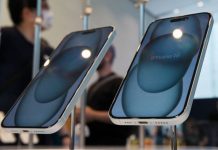
April 10 (UPI) — Apple and Google announced Friday that they’re working together to create a new system to track the spread of the coronavirus using the Bluetooth technology on mobile devices.
The companies are collaborating on a method of automatic contact tracing to let users know when they’ve come into proximity with someone who’s later gone on to test positive for COVID-19.
The platform makes use of Bluetooth technology already on iOS and Android mobile devices and would work with existing public health apps. Users would opt in to using the platform.
It works by allowing a person to input a positive COVID-19 test result into an app from a public health authority. The app would then exchange an anonymous identifier beacon with any other mobile device the COVID-19-positive user came near during the virus’ incubation period.
The beacon would let other users know if they’ve been in contact with the person with coronavirus.
Privacy experts, though, have expressed concern over how protected users’ information will be. Apple and Google say the contact tracing wouldn’t utilize or monitor GPS data, and only the anonymous beacon would be broadcast to the cloud.
The American Civil Liberties Union said the technology won’t be effective if state and federal governments don’t increase the amount of COVID-19 testing taking place.
“These systems also can’t be effective if people don’t trust them,” said Jennifer Granick, ACLU surveillance and cybersecurity counsel.
“People will only trust these systems if they protect privacy, remain voluntary and store data on an individual’s device, not a centralized repository.
“At the same time, we must be realistic that such contact tracing methods are likely to exclude many vulnerable members of society who lack access to technology and are already being disproportionately impacted by the pandemic.”






